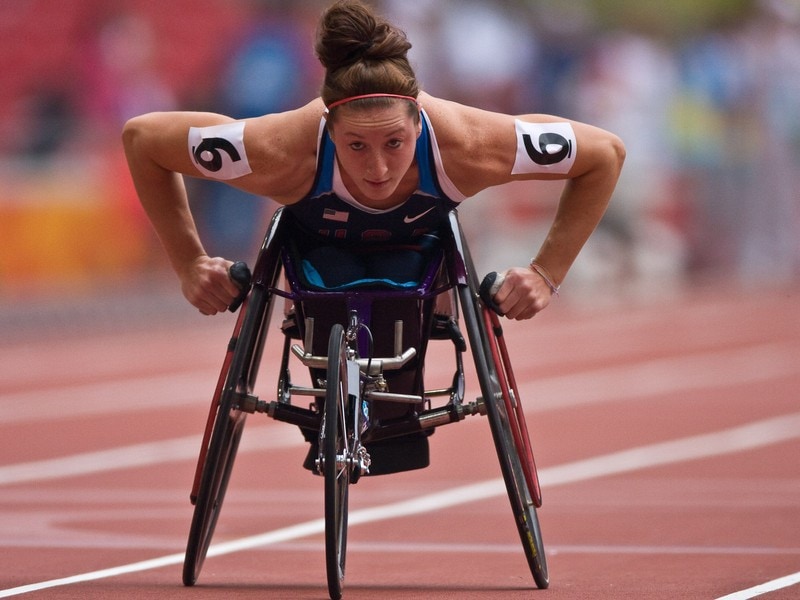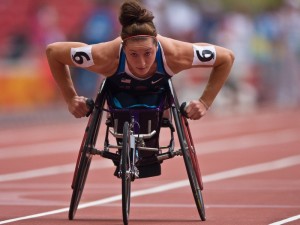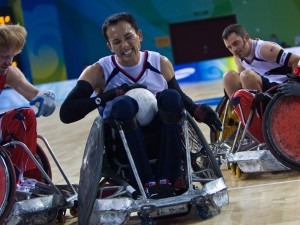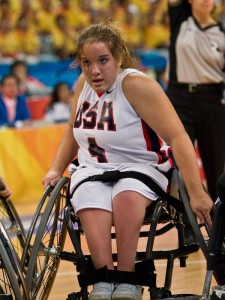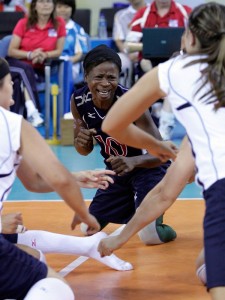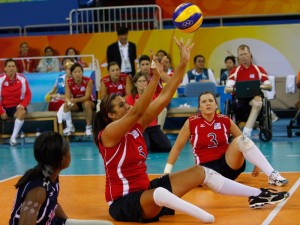The Ultimate Guide to Paralympics: Where to watch, who to cheer for and far the games have come.
Just two weeks after the closing ceremonies of the 2012 London Olympics, another set of games takes the same stage. On Wednesday, 4,280 Paralympians, elite athletes with physical and visual disabilities, will begin competing at the London 2012 Paralympic Games, an international multi-sport event with more than 20 sports over 11 days.
Some of the disabilities of the competitors include mobility difficulties, amputations, blindness, and cerebral palsy and some events are open to people with traumatic brain injuries (TBIs).
The All-Time medal tally for the Summer Paralympics Games as of Beijing 2008 shows Team USA winning by a landslide with 665 gold, 592 silver and 613 bronze for a total of 1,870 medals. In far second is Great Britain with a total of 1,420 and then Canada with a total of 947 medals. The first International Games for athletes with a disability were held in 1952 (at Stoke Mandeville Hospital in London) with only two participating countries and 130 athletes.
The games have since grown to include 166 countries. An estimated 2.2 million tickets will be sold (in contrast to 8.8 million for the Londomn Summer Olympics). The Olympics and Paralympics started sharing the same venue in 1988 (Seoul, South Korea), which is the same year the term “Paralympics” was adopted.
Although the Games are yet to be televised in the United States (a goal the National Paralympic Committees is working on), you can tune in online and catch more than 580 hours of coverage. Once you set your URL and get comfortable, stay there for a while because there’s a lot to watch. NBC Sports Network (NBCSN) will air one-hour highlight shows on Sept. 4, 5, 6 and 11 at 6 p.m. After the games, NBC will broadcast a 90-minute special on Sept. 16.
U.S. Wheelchair Rugby Team (formerly known as Murderball): The full-contact rugby in wheelchairs is most known for the
toughness and tenacity of the athletes, which was captured in the prize-winning documentary, Murderball, which detailed the rivalry between the Canadian and U.S. teams leading up to the 2004 Paralympic Games.
Because of the difficulty of marketing a sport known as “Murderball,” the name was later changed to “Wheelchair Rugby.”
The sport made its Paralympic debut at the Sydney 2000 Games.
The U.S. is a heavy favorite for gold, led by Will Groulx who was also part of the U.S. team when it won gold in Beijing in 2008 and who led the team in scoring in multiple matches. Groulx is a Navy veteran who was medically discharged after suffering a spinal-cord injury from a motorcycle accident in 2001.
You may recognize Groulx’s name as he was nominated for an ESPY back in 2009 for Best Male Athlete with a Disability for his performance as a member of the undefeated USA Quad Rugby team in the 2008 Summer Olympics.
U.S. Women’s Wheelchair Basketball: Also heavy favorites for gold, this team won the last two Paralympics in Beijing and Athens. The team has six returning players from the same team that won gold in Beijing so they mesh well and know how to take the ball up and down the court with ease.
They recently won gold at the Parapan American Games in Guadalajara after going undefeated and beating Canada by 38 points.
I had a chance to chat with Jeff Downes, Team Leader since 2007, to find out why this group of women who happen to be aiming for a three-peat in London are worth watching.
“Our team has had success since 2004 where we won the gold in Athens and then again in 2008 when we beat Germany in the final minute,” he said. “We’ve always had a strong team — strength, speed and stamina — able to wear our opponents down, but the rest of the world is catching up. We’ve lost to some teams we should have beaten and I can assure you London is going to be a brawl.
“It’s going to be very competitive and we’re looking for some fun, high-scoring games.”
You can follow the team and get updates on its Facebook page.
U.S. Women’s Sitting Volleyball: This is the sport that amazes me the most, after I watched a demo a few months back in Times Square. Having won silver last year in Beijing with a loss to China, the team has high hopes of edging out China this year in London to claim gold. The sport began in 2003 and is now powered by the American duo of Katie Holloway and Kari Miller.
The 6-foot-3 Holloway was named MVP and the Best Spiker at the 2011 Parapan American Games. Born without a fibula in her right leg, Holloway had her right foot and ankle amputated at 20 months, but she still went on to play basketball and volleyball.
She was later recruited by college basketball teams which did not even realize she wore a prosthetic leg.
The 5-foot-6 Miller helped her team win gold at ECVD Continental Cup in Yevpatoria, Ukraine, and was named the tournament’s Best Libero (defensive specialist) with 163 receptions. While serving in the military, Miller and a friend were in a car struck by a drunk driver. Miller lost both legs, one above the knee, the other below.
It should be a treat to watch these two athletes lead their team to a gold medal in London. Check out the rest of the team profiles.
April Holmes: Venturing into her third Paralympics, this will likely be Holmes’ final appearance. Holmes has been dubbed “the world’s fastest amputee” and holds world records in the 100-, 200- and 400-meters. In 2001, Holmes was involved in a train accident that resulted in the loss of her left leg just below the knee.
Holmes took her faith and worked towards a new goal of becoming a Paralympian and has been breaking records ever since.
In an accident at the Beijing Games in 2008, the spike on Holmes’ left prosthetic leg got caught in the track causing her to tumble to the ground. While on the ground, Holmes took a competitor’s spike to the face, but she still managed to force her bruised and bloodied body across the finish line. Just five days later, still in immense pain, Holmes competed in the 100-meter final.
Shocking even herself, she took gold, winning in a time of 13.72 seconds, just three seconds slower than the Olympic record held by Florence Griffith-Joyner.
The heart and soul, not to mention immense speed of Holmes should be at the top of anyone’s list of why to watch the Paralympics.
Tatyana McFadden: This veteran Paralympian is in the games for her third time. McFadden first entered the Paralympic Games in Athens at age 15. Now 23, she says she’s still a bit nervous.
“I’m very excited,” she said. “I’ve worked for four years, every day, twice a day for two hours in each session with my main focus being on the Paralympic Games.
“Getting involved in sports saved my life. The Paralympics are athletes at an elite level, people with disabilities competing at their best — it’s honoring, humbling, exciting, thrilling . . .”
As her bio states: “By all accounts Tatyana should not be one of the top female athletes in the world. She probably should not be alive. She was born in 1988 in St. Petersburg, Russia, with an underdeveloped spinal cord resulting in paralyzation below the waist and a hole in her spine, a condition know as spina bifida. When operated on immediately, spina bifida is rarely life threatening.
“Tatyana was left for 21 days before doctors operated. Only her innate strength of will kept her alive.”
She was sent to an orphanage, “an unwanted disabled child.” In 1994, Tatyana was adopted by American Debbie McFadden, who was working as the commissioner of disabilities for the U.S. Health Department.
Her new mother got McFadden her first wheelchair, and signed her up for swimming classes and then a Baltimore wheelchair sports organization to help build up her strength. Now, McFadden’s an eight-time track world champion, three-time marathon winner and full-time student at University of Illinois.
She races with her sister Hannah in the 100-meters.
“Whether I bring home a medal or not, I’m going to put in 110 percent,” McFadden promised. Famed for her strength, McFadden is also aptly nicknamed “Beast.”
This article was featured on Culture Map, Houston’s Daily Digital Magazine in the sport’s section.

